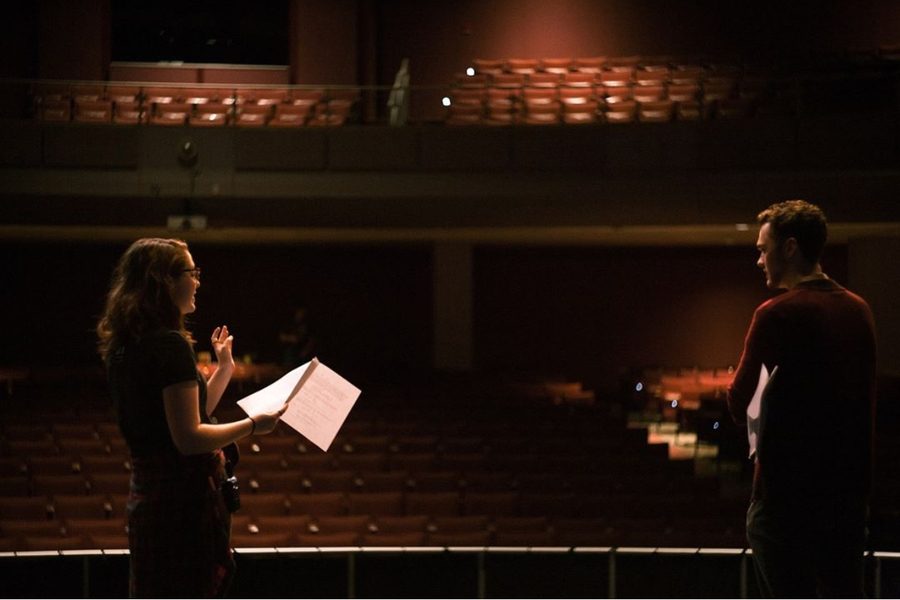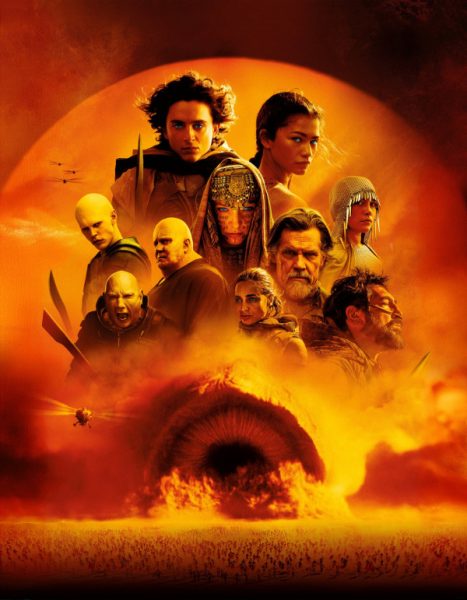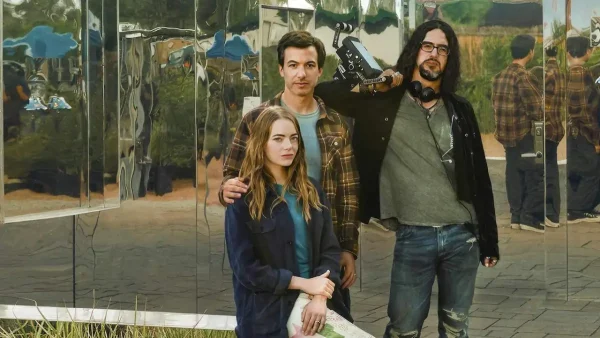Graduate Robisch makes Mice, a short film, with the help of theater students
Lincoln Robisch and his assistant director Laura Gede block out a scene on stage.
January 6, 2019
On January 3, 4, and 5, alumni and former theater student Lincoln Robisch (Class of 2017), along with his film team from Towson University, gathered in the auditorium to begin filming for Robisch’s short film, Mice.
Based on John Steinbeck’s acclaimed novel Of Mice and Men, Robisch’s film showcases a fresh insight into the storyline and applies experimental film techniques.
Mice follows the story of Tim, a high school theater student portraying George in his high school production Of Mice and Men. During the performance, Tim’s sister with a mental disability starts calling his name, distracting him from what’s going on, causing the actors onstage to frantically improvise a way to end the scene. After Tim reads a candygram from his sister telling him how much she loves him, he must make the decision of what’s more important, the show or his sister.
The eight-minute short film is split into separate scenes like a traditional film but was recorded in one take. In other words, there are no breaks, or “cuts,” between the filming of each scene.
Along with the cast of students from Towson University, high school drama students were invited to participate as extras. Among them was junior Rowan Gallagher, theater student and cast member of Linganore Drama’s upcoming production, Beauty and the Beast.
“I thought that it would be a fun experience,” said Gallagher. “And it definitely was. It was really cool, and it was nice to see him [Robisch] again.”
Junior theater student Jacob Blue was a little more involved. Blue was offered a small named role in Robisch’s film after being sent a copy of the script shortly before filming began.
“I’ve done many productions with Lincoln behind the scenes and in front of the camera,” said Blue. “Being able to be a part of the films he makes is an experience that has shown and taught me many lessons on how films are made.”
Blue, having experience in both films and live theatrical performances, has grown an understanding of how both operate within their own media.
“With film, if you mess up, you can fix it during the next take,” said Blue. “Theatre is live, so you have to make sure everything is adequate for that one performance.”
Gallagher shared similar thoughts on the comparison.
“Filming is different than doing it live. When you film, you have to do the same thing [practically] two hundred times to get it right,” said Gallagher. Although Robisch’s film was in one take, there were plenty of takes to make sure it was completed in a continuous flow of the camera.
“The project was really a test for me. I’ve acted in projects I’ve directed before. I’ve shot a long take short film before. I’ve never acted in a long take short film that I’m directing before. It was incredibly exhausting bouncing from one boat to the other. I would not have been able to do it all had I not had a wonderful assistant director, Laura Gede, who was also kind of doubling as an acting coach when I couldn’t watch myself. Despite these things the set actually ran incredibly smoothly so is hard for me to find anything I’d do differently. The most important thing was to make sure I spent tons of time in pre-production with every department head and made sure they knew exactly what I wanted and so that I knew that they knew exactly how to make it happen,” said Robisch.
Mice is about stress, love, and morality and how a person’s judgment can cloud a sense of empathy. Every camera angle, lighting position, and line of dialogue spoken is meant to build this atmosphere. Robisch hopes to give a glimpse into his personal experience to make sure others don’t make the same mistakes.














